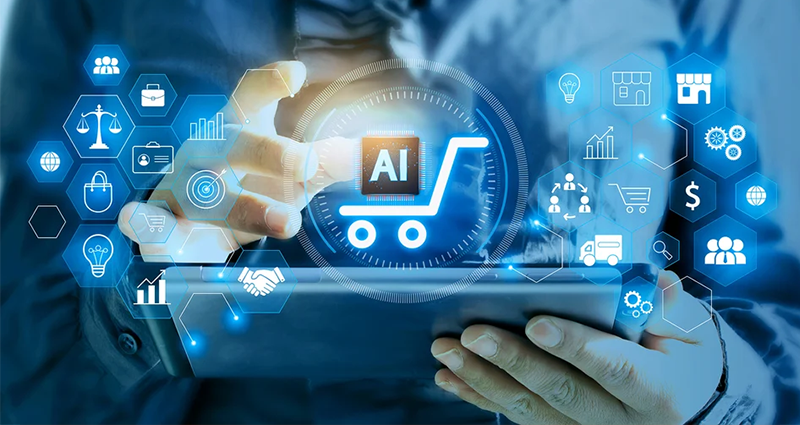Customer Experience in 2026: The True Differentiator in Competitive Markets
10 January 2025

One of the most significant impacts AI is making in e-commerce is in hyper-personalization. AI algorithms analyze customer data such as browsing history, past purchases, and preferences to offer individualized product recommendations and promotions. As AI evolves, these personalized experiences will become more intuitive and precise, creating unique shopping journeys for each user.
Imagine shopping on an e-commerce platform where AI predicts your needs before you even think of them, offering curated product suggestions, personalized discounts, and even customized website layouts based on your preferences. Retail giants like Amazon and Alibaba are already leveraging AI-driven personalization to keep users engaged, but the future promises even more advanced personalization techniques, making online shopping seamless and intuitive.
AI-powered virtual assistants and chatbots are rapidly becoming indispensable tools in the e-commerce ecosystem. These tools help retailers provide 24/7 customer support, handling tasks like answering questions, assisting with product selection, and resolving issues without the need for human intervention. As AI improves, virtual assistants will be able to manage more complex queries and offer real-time, personalized recommendations.
Looking ahead, the role of AI in customer service will continue to grow. Chatbots will become more conversational and intuitive, mimicking human interactions closely. Retailers will be able to offer instant support across various platforms, ensuring that customers receive immediate assistance throughout their shopping experience.
AI is transforming the way consumers search for products online. Natural language processing (NLP) and image recognition are enhancing search functionalities, allowing customers to find what they want faster and more accurately. AI-powered search engines interpret user intent more effectively, offering more relevant results even for vague or incomplete queries.
Visual search, powered by AI, is also gaining momentum. Shoppers can now upload an image to an e-commerce platform, and AI will identify and suggest similar products available on the site. Companies like Pinterest and Google are pioneering visual search technology, and as it advances, it will become a standard feature for e-commerce platforms, simplifying the shopping experience for users.
AI is transforming back-end operations like inventory management and supply chains. AI algorithms can predict demand patterns based on historical data, trends, and external factors such as holidays or market shifts. This predictive capability helps businesses optimize stock levels, reducing instances of overstock or stockouts, improving profitability, and enhancing customer satisfaction.
In the future, AI will fully automate supply chain processes, providing real-time insights into inventory levels, warehouse operations, and logistics. This will enable faster and more efficient order fulfillment, making it easier for businesses to scale and adapt to market fluctuations.
As voice-activated devices like Amazon's Alexa and Google Assistant become more common, voice commerce is emerging as a new frontier in e-commerce. AI-driven voice assistants can help customers search for products, make purchases, and track orders through simple voice commands. This hands-free shopping experience is becoming increasingly popular and will play a significant role in the future of e-commerce.
Retailers are investing heavily in optimizing their platforms for voice search, ensuring that customers can interact with their brand seamlessly via voice commands. As AI continues to improve, voice assistants will become even more accurate and personalized, making voice commerce a primary mode of shopping for many consumers.
AI’s ability to analyze vast amounts of data in real-time allows retailers to implement dynamic pricing strategies, adjusting prices based on factors like demand, competition, and customer behavior. This ensures that prices remain competitive while maximizing profitability.
In the future, AI-powered pricing models will become even more sophisticated, offering real-time price optimization that accounts for external data like weather conditions, local events, or market trends. Customers will see more personalized pricing, and retailers will have the ability to respond quickly to shifts in market demand.
As e-commerce grows, so does the risk of fraud. AI is playing a crucial role in detecting and preventing fraudulent activities. Machine learning algorithms can analyze transaction data to identify suspicious behavior patterns and flag potential fraud before it happens. This proactive approach to security helps protect both consumers and retailers from cyber threats.
Looking forward, AI-driven fraud detection will become more advanced, with real-time risk assessment systems that continuously monitor for anomalies and potential threats, making online transactions safer and more secure.
The future of e-commerce will be defined by the integration of AI and augmented reality (AR). AR allows customers to visualize products in their environment before making a purchase. AI enhances this experience by offering personalized AR suggestions and optimizing virtual try-on technologies for products like clothing, accessories, or home decor.
Brands like IKEA and Sephora are already leveraging AR to let customers visualize furniture in their homes or try on makeup virtually. As AI and AR technologies continue to advance, these immersive shopping experiences will become more sophisticated, bridging the gap between online and offline shopping.
The future of AI in e-commerce is bright, with advancements in personalization, automation, and customer service leading the way. AI is making shopping more intuitive, efficient, and secure, while also transforming the backend operations of online retail businesses. From AI-driven search and personalized shopping experiences to voice commerce and predictive inventory management, AI is set to redefine how we shop in the digital age.
As AI continues to evolve, businesses that embrace these technologies will have a significant competitive advantage, offering customers a seamless and enhanced shopping experience. The future of e-commerce will be shaped by AI’s ability to anticipate and fulfill the needs of both consumers and businesses, creating a smarter, more connected world of retail.
With AI at the forefront, e-commerce is on the brink of a technological revolution that will not only transform how we shop but also how businesses operate in the ever-evolving digital landscape.